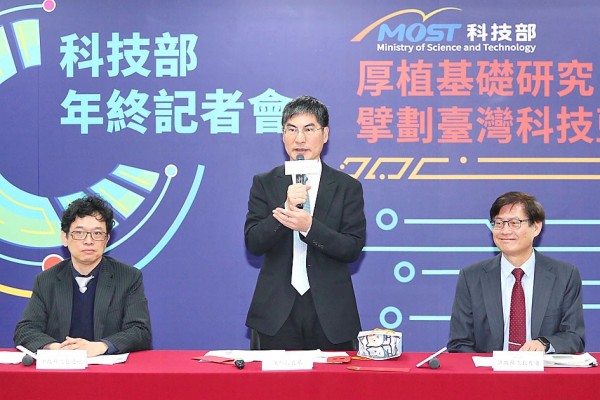《TAIPEI TIMES》 Educating tech talent key for Taiwan

Minister of Science and Technology Chen Liang-gee, center, speaks at a year-end news conference at the ministry yesterday in Taipei, as deputy ministers Hsieh Ta-pin, left, and Hsu Yu-chin look on. Photo: CNA
BUILDING A FUTURE: Chen Liang-gee said his ministry pushed to hold the national science and technology conference a year early as it seeks to counter a brain drain
By Lin Chia-nan / Staff reporter
Minister of Science and Technology Chen Liang-gee (陳良基) used an annual lunar-year-end news conference in Taipei to outline the government’s plans to boost the nation’s technological competitiveness, including a new subsidy program for outstanding doctoral students in key technology fields.
The Ministry of Science and Technology’s budget this year is NT$38.8 billion (US$1.26 billion), up from last year’s NT$36.5 billion — which had been an eight-year low, and it would continue striving to boost its budget for basic research, Chen said.
To draw up a road map for the nation’s technological development, the ministry has advised the Executive Yuan to move up the 11th national science and technology conference to this year, instead of next year, and it would host several preparatory meetings to collect opinions prior to the conference, he said.
Taiwan has a shortage of people in fields related to biotechnology and digital transition, including gene sequencing, manufacturing, artificial intelligence and the Internet of Things, and quantum computing, he said.
The number of students in doctoral programs related to information and communication technologies has declined by 45 percent over the past decade, Chen said.
Executive Yuan data showed that in 2017, almost 736,000 Taiwanese moved abroad for work, with 55 percent going to China, 13.7 percent to the US and 14.8 percent to Southeast Asian countries.
To encourage Taiwanese to pursue higher degrees, the ministry plans to offer monthly subsidies of NT$30,000 to NT$50,000 to 600 outstanding doctoral students every year, so they will not have to worry about earning money, he said.
Hopefully, the subsidy program will be in place before September, but his ministry needs further talks with the Ministry of Education about dividing the expenditure, he said.
Local companies should boost salary levels and improve working conditions and career advancement to help curb the brain drain, as well as providing schools with more resources to cultivate talented individuals, Chen said.
Many other nations, including Israel, France and the UK, have expressed an interest in recruiting Taiwanese high-tech talent, so students should be willing to move outside their comfort zones and apply for overseas training projects, he said.
The science ministry’s plan to send Taiwanese to intern at Uber’s San Francisco headquarters would start as soon as there are enough qualified applicants, he said.
Taiwanese often impress foreign tech firms with their solid academic training, but they should strengthen their oral presentation skills to gain an edge, he added.
新聞來源:TAIPEI TIMES
%http://www.taipeitimes.com/




















